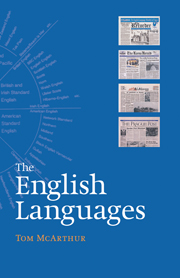9 - The shapes of English
Published online by Cambridge University Press: 12 October 2018
Summary
International English [Late 20c: with or without a capital/]. The English language, usually in its Standard form, either when used, taught, and studied as a lingua franca throughout the world, or when taken as a whole and used in contrast with American English, British English, South African English, etc.
(Tom McArthur (ed.), The Oxford Companion to the English Language, 1992)Black English 1. Also called Afro- American English. a dialect of American English characterized by pronunciations, syntactic structures, and vocabulary associated with and used by some North American blacks and exhibiting a wide variety and ränge of forms varying in the extent to which they differ from Standard English. 2. any of a variety of dialects of English or English-based pidgins and creoles associated with and used by black people. Also, black English.
(Sol Steinmetz (ed.), Random House Compact Unabridged Dictionary, 1996)English or not English? — The Ebonics outbreak
On the 18th December 1996, as business was winding down for Christmas in the city of Oakland in California, the local school board unanimously passed a resolution. Although hardly routine, it was in tune with other decisions made in US educational circles in recent times regarding educational achievement, classroom language, and Standard English, so the board members apparently did not expect it to raise much interest beyond the immediately affected schools - and maybe not even there. Oakland has a large black population, and its teachers and educational administrators have long been concerned with the low level of achievement among African-American children. The board, therefore, decided to change its existing policy regarding children's everyday language and competence in the Standard language. However, the decision was swiftly reported in the local media and public reaction was instant and widespread, despite Christmas and the New Year. As two Californian journalists put it shortly afterwards:
Saying it has failed to adequately educate black youngsters, the Oakland Unified School District has declared black English a second language, making it the first district in the nation to give the dialect offirial Status in programs targeting bilingual students. The move to recognise the black vernacular - called ‘Ebonics’ by some educators who consider it a distinct language spoken by the descendants of slaves - was approved unanimously by the Oakland school board.
- Type
- Chapter
- Information
- The English Languages , pp. 197 - 234Publisher: Cambridge University PressPrint publication year: 1998



